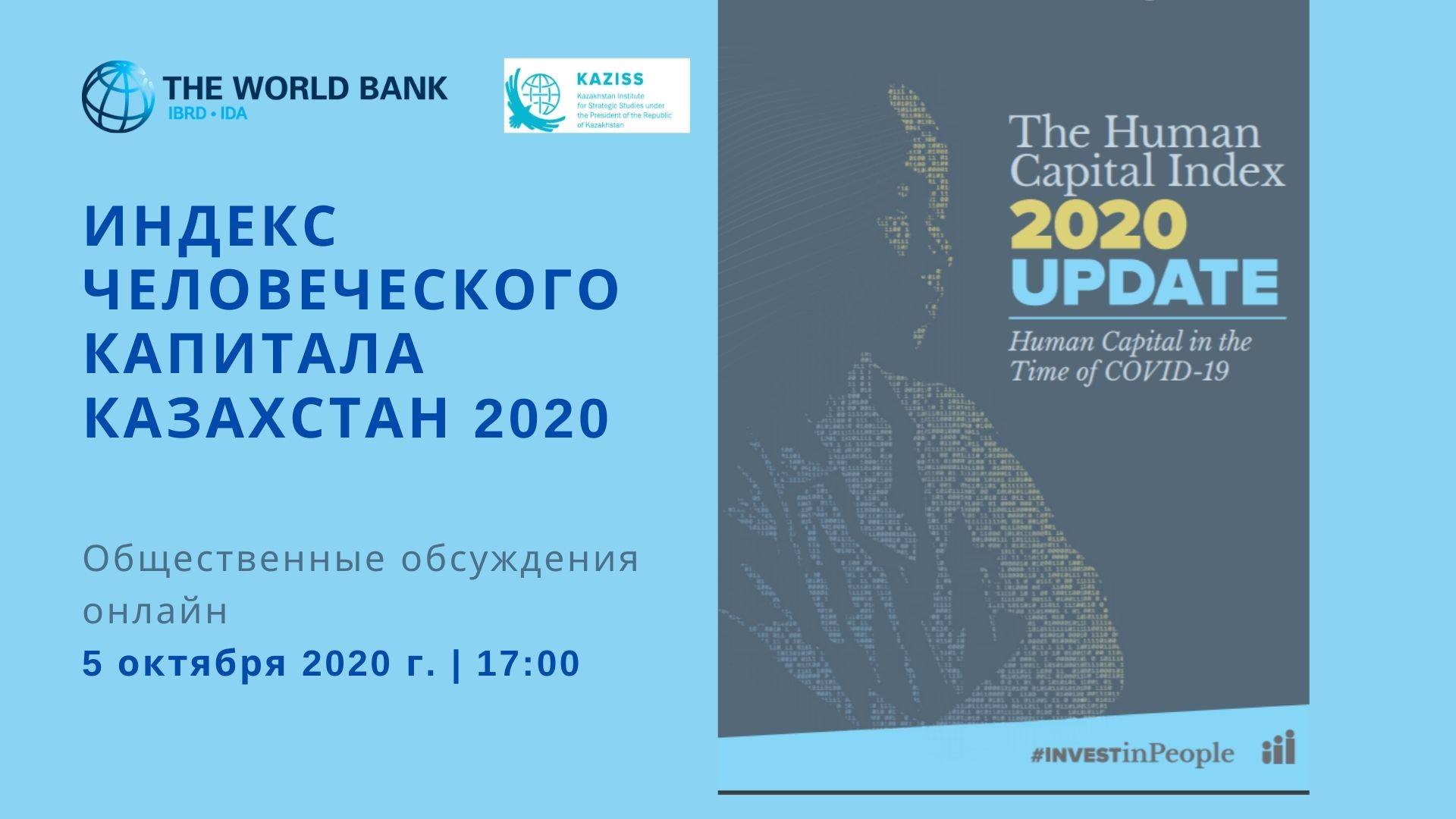
News
Public Discussions on the Human Capital Index of Kazakhstan
October 6, 2020


sources
Speakers and Discussants:
1. Gary Anthony Patrinos - Head of the Global Education Practice for Europe and Central Asia of the World Bank, presentation of the "Human Capital Index 2020"
2. Zhaikov Kuanysh - representative of the Research and Consulting Center (CRC)
3. Shulanov Yerlan Nurlybekovich, President of the Joint Stock Company "Information and Analytical Center", MES RK
4. Susanna Hayrapetyan, Head of Human Capital Programs of the World Bank for Central Asia
Moderator: Sabina Sadieva, Deputy Director KARI under the President of Republic Kazakhstan
The labor productivity of a child born in 2020 in Kazakhstan before the start of the pandemic, upon reaching adulthood, could be about two-thirds of the potential level, World Bank experts said today in an online public discussion organized in collaboration with the Kazakhstan Institute for Strategic Studies under the President of the Republic of Kazakhstan.
The Human Capital Index (HCI) measures the level of knowledge and skills that a child now born can acquire by the age of 18, taking into account the risks associated with the education and health system in a particular country.
The 2020 HCI shows that, prior to the outbreak of the pandemic, most countries had made steady progress in developing human capital for children, with low-income countries making the most strides. Despite this progress, and even before the impact of the pandemic, it was expected that a child born in a typical country could reach as little as 56% of their potential human capital, provided they are fully educated and healthy. The data for 2020 also provides historical figures from 2010 to track the development of human capital over the past decade.
Kazakhstan performs relatively well in the World Bank's 2020 Human Capital Index with a score of 0.63, which means that a child born in Kazakhstan before the outbreak of the pandemic can achieve an average of 63% of its potential productivity level. While the index shows a number of advances made over the past decade, the quality of education in the country has declined. The indicator for 2020 reflects an increase of 4 points over 2010, which is mainly due to an improvement in the survival rate of the adult population, which is 84%, as well as a decrease in the level of developmental delay among children under 5 years of age (92% of children do not have developmental delays). ). A Kazakhstani child who enters school at age 6 is expected to complete 13.7 years of schooling by age 18.
The COVID -19 pandemic is expected to negatively impact health and education.
“According to our recent estimates, 7 out of 10 students in Kazakhstan may be functionally illiterate; will lack the range of skills and competencies that enable people to succeed in modern society. This is a consequence of the learning loss due to COVID -19, which will reduce the expected income of this group of people by approximately 2.9% and can lead to total economic losses of up to US $ 1.9 billion per year (based on PPP 2011 in US dollars),”said Harry Patrinos, Head of the Global Education Practice for Europe and Central Asia at the World Bank.
More importantly, the decline in the level of human capital will differ depending on the socio-economic conditions of the child. A child born today in the 20% of the richest families has a chance of reaching 64% of his potential productivity level, while a child born in the 20% of the poorest families will reach 53% of his potential. This difference is especially pronounced in terms of learning outcomes, where students from wealthy families scored 452 points in the uniform test scores, while students from low-income families scored an average of 371 points.
“A healthy, well-educated and skilled person has the opportunity to reach their full potential and thus contribute to the prosperity and development of society,” said Jean-François Marteau , World Bank Country Manager for Kazakhstan. “In the future, Kazakhstan needs to continue to invest in human capital development to maintain the pace of transformation even in difficult macroeconomic conditions and taking into account the threats to public health in the context of the COVID -19 pandemic. The World Bank will continue to assist the country in its efforts to strengthen human capital through projects aimed at improving the health of citizens, modernizing the education system, stimulating innovation, developing skills, and more. "
Director of the Kazakhstan Institute for Strategic Studies under the President of the Republic of Kazakhstan Zarema Shaukenova noted: “The head of state always pays special attention to the development of human capital, emphasizing that human capital is the main source of success for any state. This index allows us to quantify the contribution of health and education systems to the productivity and income levels of the next generation of Kazakhstanis. Thus, the HCI data for 2020 can also serve as a basis for government decisions during the recovery from the pandemic. ”
The World Bank Group, as one of the largest sources of funding and knowledge for developing countries, is taking large-scale and rapid action to support developing countries in strengthening their response to the spread of the pandemic. We support public health activities and help the private sector continue to operate and maintain jobs. Over the next 15 months, we will provide up to $ 160 billion in financial support to help countries protect the poor and vulnerable, help companies and accelerate economic recovery; this includes $ 50 billion of new IDA resources to be provided in the form of grants or loans on extremely concessional terms.
Additional country data can be found or downloaded at: http : // www.worldbank.org / humancapital
all publications











